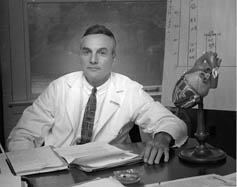T. Royle Dawber
Year: March 2nd, 2001
Interviewed by: Blackburn, Henry
Abstract
Roy Dawber provides a far-reaching account of the Framingham Heart Study and of its importance to public health. He clarifies the continuous relationship between Paul Dudley White and Framingham. The importance of maintaining good relations with local physicians is discussed, as are the ideological differences between laboratory- and clinic-based physicians. Dawber details his successful efforts to raise funds when the NIH decided to terminate Framingham in the 1970s.
The interview ends with a consideration of the mainstream effects of CVD epidemiology, what researchers have done well and what they might have done better. (SF)
Quotes
The basic task for me was to make sure the medical professionals understood that we were not involved in medical care. . . Occasionally you found something wrong with a guy that the guy’s doctor wasn’t finding. It took a little diplomacy to get that information back to him without making him think ‘you guys are trying to tell us how to practice medicine.’ But I had good relations with the doctors in town. I got to know a lot of them and we used to eat lunch over at the hospital all the time. And that had a lot to do with it. A lot of these things are in sort of under-the-table ways, in the way you do stuff. You have to do it to make something succeed.
It’s disturbing to me to see young people smoking …. People have no grasp of the fact that this is a real killer. I think the message with regard to say, alcohol, has been pushed all right. And I think that message has gotten across. But I don’t think it has as far as smoking goes. I would suppose it’s probably the effect of the tobacco advertising. Sure, most of the tobacco advertising has been cut out, I suppose that’s one big move. But it still manages to get across to the kids.
I think that what we have done has been partly at least responsible for the changing view people have of medicine. What do you think about it? Like the time I graduated from medical school the thought was that the doctor’s the guy you go to when you’re sick. Sickness was something that happened to everybody and the doctor didn’t control any of that sort of thing. But you went to the doctor when you were sick. Instead of the fact that now, the doctor is concerned about what are the factors that make you sick. His main responsibility is now shifting from taking care of sick people to trying to prevent people from becoming sick. And I think we’ve had a big role in doing that.
Full Transcript Access
Full transcripts of interviews may be made available to those engaged with original materials for scholarly studies by contacting us.
